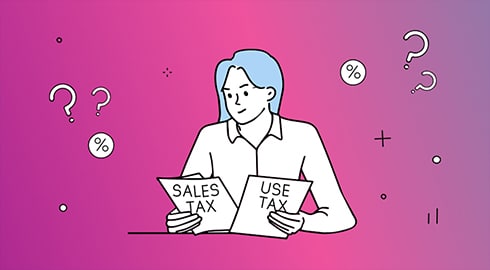Sales tax obligations are crucial for businesses because they determine each sale’s sales tax rate and compliance requirements. Failure to comply with sales tax obligations can have far-reaching consequences, impacting the bottom line and potential business growth.
Many ethical and conscientious companies discover they’ve failed to comply with their sales tax obligations every year in the United States. And while auditors can lend a sympathetic ear, the law is the law at the end of the day.
Operating in one state or selling various products or services can be complex and confusing come financial year-end. But if you’re selling products or services in multiple states, you can quite reasonably multiply the complexity factor by the number of states.
Most US states require businesses to collect and remit sales and use taxes even if the company has no in-state physical presence. Especially for remote sellers, the requirement to comply with economic nexus obligations and local tax laws must be baked into their operational procedures.
If left unchecked, these state and local tax obligations and the corresponding potential liability for tax, interest, and penalties compound over time.
Can this process be simplified?
Navigating the tax maze by debunking 7 myths about sales tax exemptions
Sales tax exemptions are provisions in tax laws that exempt certain goods, services, or transactions from being subject to sales tax. Exemptions serve various economic, social or policy objectives. As with any complex field, sales tax exemptions are prone to misunderstanding, misinterpretation, and myth.
For instance, don’t believe that all non-profit organizations (NPOs) are automatically exempt from sales and use tax due to their Federal 501(c) status. You must apply for that privilege if you’re an NPO in Nevada.
Here are some others you may have heard before.
Myth 1: Exemption certificates are unnecessary
A common misconception is that you don’t need an exemption certificate when claiming a sales tax exemption.
In most cases, businesses must provide valid exemption certificates to the seller as proof of their eligibility for exemption. Failing to provide the necessary documentation can result in sales tax being imposed on the transaction.
Myth #2: Exempt sales do not trigger tax obligations
This is not always the case. Exempt sales can be a reason for businesses to be flagged for a sales tax audit. State agencies analyze the ratio of a business’s taxable and exempt sales to determine audit selection. If a company has a high volume of exempt sales, it may be audited to ensure it properly collects and reports sales tax.
Furthermore, even if all your sales fall under exempt categories and you’re not collecting sales tax, you are still required to include these transactions in your sales tax return. This means that you still have obligations related to filing your tax return.
Myth #3: One exemption certificate fits all
The fact is there are many exemption certificates, and they vary based on entity type and purchase purpose. For instance, nonprofit organizations may need different exemption certificates for buying goods and services. Since each state has unique rules, businesses should check and get the proper exemption certificates for each state to stay compliant. As well as checking on the out of state sales tax they may need to pay.
Myth #4: Exempt sales can be handled manually
Yes, it’s physically possible. But particularly as your business expands, automated sales tax platforms can play a pivotal role in minimizing the risk of errors and optimizing operational efficiency.
Also, be aware that certain states issue exemption certificates with expiration dates. Consequently, even after collecting certificates from your customers, ongoing monitoring and requesting renewals are necessary each time a certificate reaches its expiration date.
Myth #6: Exempt sales are always audit-proof
While exempt sales may seem less likely to trigger an audit, no company should bank on it, making them immune.
Auditors may still question the exempt status of a sale, even if the seller has adequately documented it.
Additionally, businesses with a high volume of exempt sales may be audited to ensure they are correctly collecting and fulfilling the sales tax reporting requirements by state.
Myth #7 International sellers are exempt from U.S. sales tax
Nein, non,לאا, não, नहीं, 不, no. International sellers are NOT exempt from collecting and remitting US sales tax, as sales tax laws apply to all sellers who have nexus in a state and may be liable for e-commerce nexus sales tax. If nexus sounds like a foreign word to you, don’t worry. It will all make sense in a moment.
Economic nexus thresholds and their connection to exempt sales
A tax nexus is a crucial concept in sales tax. It represents a connection or presence a business has in a particular jurisdiction, typically a state, that triggers the obligation to remit and collect sales tax on transactions within that jurisdiction.
It is the minimum threshold of activity that a business must have in a state before it is obligated to collect and remit sales tax in that state. Each state has a different sales tax threshold that triggers an economic Nexus. In Michigan, for example, you will reach the threshold at $100,000, or 200 transactions, whichever comes first. (Find our 101 guide to nexus here.)
That’s how Nexus can affect a company’s exempt sales. Because even though exempt sales aim to avoid sales tax for specific transactions, nexus still applies, and it can lead to unforeseen consequences for an organization.
This is how.
Threshold consideration
Economic nexus laws establish thresholds, often based on sales volume or transaction count, that trigger tax obligations in a state. While traditional nexus criteria focus on taxable sales, economic nexus can include taxable and exempt sales when determining if a business surpasses the threshold.
Threshold inclusion
In some states, exempt sales are counted alongside taxable sales when assessing economic nexus thresholds. This means that even if a business primarily deals with exempt transactions, the total sales—including exempt sales—could push the company over the economic nexus threshold.
Unexpected tax liabilities
The interaction between exempt sales and economic nexus can lead to unexpected tax liabilities. A business that was previously exempt from collecting sales tax may suddenly find itself obligated to do so if economic nexus is triggered by its exempt sales.
State Variations
It’s crucial to note that the treatment of exempt sales in relation to economic nexus varies from state to state. Each state has its own rules and criteria for determining economic nexus, and some may include exempt sales in their calculations, while others may not.
Understanding the common tax exemption categories:
To comply with sales tax regulations and avoid unexpected penalties and fines, it’s vital to grasp the main categories under which sales tax exemptions fall.
Product-based exemptions
These exemptions cover a range of essential items deemed crucial for everyday life. They include necessities such as groceries and unprepared foods for home consumption.
In many jurisdictions, important medical items like prescription medicines, over-the-counter drugs, and various medical supplies also fall within the scope of these exemptions.
Use-based exemptions
This type of exemption considers how a purchased item will be utilized. For example, if a product is intended for resale, it may qualify for a resale exemption.
Similarly, items used for agricultural production or manufacturing processes might be eligible for use-based exemptions.
Buyer-based exemptions
This exemption focuses on the characteristics of the purchaser. Specific buyers, such as nonprofit and charitable organizations or government agencies, may qualify for exemptions on their purchases. To claim these exemptions, buyers must meet specific criteria and provide the necessary documentation.
In addition to these three main categories, several other sales tax exemptions exist. For example, some states offer exemptions for sales to the federal government, agencies, schools, veterans organizations, and certain types of businesses. Companies must meet specific criteria and provide proper documentation to qualify for sales tax exemption.
Ensuring exempt sales tax compliance: best practices
Managing exempt sales correctly is crucial for companies, as it helps reduce tax liabilities and ensures compliance with regulatory requirements. To stay compliant with your exempt sales taxes, here are three things to remember.
Understand the different categories of exemption
It’s necessary to know the common tax exemption categories we covered above because recognizing which exemptions apply to your business and the specific criteria that must be met to qualify for each tax exemption certificate.
Maintain proper documentation
Documentation is your best friend when it comes to tax compliance, and exempt sales are no different. Ensure you maintain accurate and complete records of all your exempt transactions, including tax exemption certificates and relevant supporting documents. This documentation will be essential in case of audits or inquiries.
In our onboarding calls with customers, we will request the necessary tax exemption certificates (when applicable), which are essential for achieving tax compliance.
Stay informed about changing state-specific exemption rules
Sales tax exemption rules can vary significantly from one state to another and are subject to change. Stay informed about state-specific exemption rules and any updates or revisions that may occur. Utilize resources provided by tax authorities or consult with tax professionals to remain compliant.
Penalties and repercussions: the risk of non-compliance with exempt sales tax
Failing to meet specific sales- and tax obligations can harm a business. For example, a business that neglected to pay sales taxes by the filing date or through an installment plan loses its trading license
Financial penalties
Tax authorities penalize companies that don’t comply with exempt sales tax regulations. These fines are typically calculated based on unpaid sales tax, non-compliance duration, and the specific regulations of the jurisdiction in question. As penalties accumulate, the financial stability of companies may be compromised.
Interest charges
Businesses that fail to meet their sales tax obligations may incur interest charges on the unpaid tax amounts. Interest accrues over time and can significantly increase the total amount owed, making it even more challenging for businesses to resolve their tax issues.
Legal quicksand
Non-compliance can quickly lead to legal challenges and disputes. Tax authorities may initiate legal actions against non-compliant companies, resulting in costly litigation and legal fees. Navigating this legal quicksand can be time-consuming and operationally draining for business owners.
Company costs
Beyond the direct financial penalties and interest, non-compliance can increase business costs in various ways. Companies may need to allocate resources to address compliance issues, hire tax professionals or legal counsel, and divert time and effort away from core operations. These added expenses can erode profitability and hinder business growth.
The risk to officers and shareholders
The management responsible for overseeing tax compliance within a business, such as officers and shareholders, may also face personal liability for non-compliance with tax law. For example, responsible party laws stipulate that CEOs, CFOs, directors, and individuals with influence over a company’s tax and accounting procedures may bear personal liability for any deficiencies in sales tax payments.
This means they could be held personally accountable for any violations or failures in tax compliance, potentially facing legal consequences and reputational damage.
Conquer your sales tax obligations with Complyt
Complyt helps companies sidestep expensive mistakes and easily avoid the pitfalls that can lead to an audit. Here’s how:
- Put compliance on autopilot: Enjoy error-free compliance, even when dealing with exempt sales. Complyt’s automation guarantees precise tax calculations, reducing the risk of costly mistakes associated with exempt transactions.
- Real-time updates: Stay informed about evolving tax regulations, especially regarding exempt sales. Complyt provides real-time updates, ensuring you’re always in the know when dealing with exemptions.
- Streamlined record-keeping: Our platform simplifies the maintenance of necessary records, ensuring your documentation remains impeccable to support your sales tax compliance, including exempt transactions.
It’s time to focus on what you do best—growing your business. Contact our sales team and discover how Complyt can simplify compliance duties.
FAQ
What are sales tax exemption certificates?
They are official documents that allow purchasers to conduct tax-free transactions that typically result in sales tax charges. The purchaser completes the exemption certificate and submits it to the seller, who retains the document and can subsequently conduct property or service transactions with the purchaser without applying sales tax.
What is a resale exemption certificate?
A resale exemption certificate is a document that allows businesses to purchase items for resale without paying sales tax. It’s not the same as a sales tax exemption certificate. While these common tax exemption certificates allow for tax-exempt purchases, they serve different purposes.
How do you obtain a valid exemption certificate?
To get the correct exemption certificate, businesses must follow the specific guidelines for a properly completed certificate set by their state.
What is the difference between sales and use tax?
The key distinction centers around when and by whom the tax is collected and remitted. The seller gathers sales tax during the sale. In contrast, use tax is typically paid directly by the purchaser to the taxing authority, especially when sales tax was not collected at the point of purchase. Although both taxes share a common goal of generating revenue for state and local governments based on consumption, they differ in their application and collection approaches.
Are all nonprofits exempt from sales tax?
Not every nonprofit organization is automatically exempt from sales tax. The exemption from sales tax for nonprofit charitable organizations varies from state to state and is subject to specific criteria and regulations set by each jurisdiction.
Is there such a thing as a blanket sales tax-exempt certificate?
Yes, blanket certificates can be used in some states. A blanket exemption certificate is a single certificate maintained with the vendor, which can be utilized for all exempt purchases made from that specific vendor without the need for separate certificates for each transaction. For instance, New York allows a blanket exemption certificate for purchases from a single vendor.
How can I obtain a wholesale sales tax exemption?
In some states, a resale certificate can be used as a blanket exemption certificate for wholesale purchases. The specific requirements for obtaining a certificate may vary by state.
What is e-commerce nexus sales tax?
E-commerce sales tax is the tax you levy and collect from your online customers. It’s similar to the tax you charge customers at a brick-and-mortar store. Establishing nexus can vary depending on the state and can result from having a physical presence like a store or warehouse or employing personnel there. Economic nexus, conversely, signifies that if you reach a specific sales threshold in a state, you might be obligated to collect and remit sales tax, even without a physical presence.









